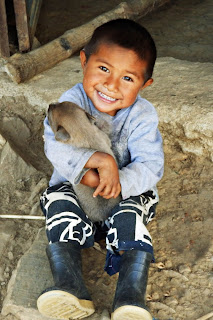"I was a Satanist. They tried to lynch me." That was how Ezequiel began his story. I have to admit that he caught my attention with that; after all, he had been one of my quietest, sweetest seminary students. I never would have guessed his background.
We had arrived in his hometown of San Sebastian Coatan, a gorgeous little community way up in the Cuchumatanes Mountains where the clouds never completely lift. He and his friend Luis, another one of my students, were giving Linda and me the grand tour of their village. It didn't take long. At the end, they took us up to see a Mayan altar at the very top of an enormous gorge. Ezequiel and I wandered over to the edge and just stared at the expanse of rippled mountains in front of us. After a while, he started talking.
"I was a Satanist. They tried to lynch me." And he went on to tell me what a rough childhood he'd had. His father had fought in Guatemala's Civil War, during the course of which he'd killed well over 20 people. That takes a toll on a man. He started drinking and taking his rage out on his wife and kids. Ezequiel was so angry with his father and so desperate to protect his mother that he was willing to do anything. He'd heard that Satan was powerful and wanted to see that power for himself, so he joined a small group of other young people, and together they set out to worship the devil. One afternoon they went out to the pinnacle of a jagged, oval shaped boulder embedded in the side of the cliff to perform some rituals. Ezequiel pointed out the spot to me as he talked. "One of my friends fell to his death right in front of me that day," he said. When the villagers heard what had happened, they blamed Ezequiel just because he had been there. They grabbed him, tore his clothes, and beat him. This is the beginning of the lynching process here. Once the victim (or perpetrator as the case may be) has been beaten to the point that they are unable to fight back, they are doused with gasoline and burned alive. Fortunately, the crowd did not get that far with Ezequiel. The police showed up, pulled him from the middle of the mob, and took him to jail. There is no such thing here as "innocent until proven guilty." Ezequiel spent quite a bit of time incarcerated.
"It was there that the devil marked me. Want to see the scar?" He lifted his shirt to reveal a series of slashes on his mid back. "Satan came to me while I was sleeping and attacked me with claws like razors. It was then that I decided I didn't want anything more to do with Satan, and I gave my life to Christ." When Ezequiel got out of jail, he immediately set out to learn more about God's Word. He figured the best place to do that was in seminary, so he did some research and found Instituto Biblico Berea. In order to get in, he needed to be a baptized believer with a letter of reference from a church, so he found a Christian church and asked the pastor to baptize him and give him a letter. Thank God this pastor was a discerning man and took a chance on him! He was baptized immediately because that's the biblical model: "Get saved, get baptized," the pastor said, and then he wrote Ezequiel a letter of reference so he could apply. I would love to meet that pastor someday and shake his hand!
This is how Ezequiel ended up in my classroom studying the book of Romans two weeks ago. It gave me goosebumps when he looked at me and said, "It really made an impact on me when you taught us about the doctrine of imputation...how God not only wipes our slates clean, but He gives us all the righteousness of Christ. What a gift!" It still gives me shivers just to write it out. To me, the doctrine of imputation is one of the most amazing things in the whole Bible, and not only did I receive Christ's righteousness myself, but now I get to teach others about it!
After five years of study, Ezequiel will graduate next month. I am so incredibly proud of how far he's come! He is already pastoring in the jungle, six hours away from his hometown. I asked him if he liked the heat of the jungle, especially after having grown up in a cool mountain climate. He answered, "I don't really like the heat, but I told God to use me however He sees fit. I will go anywhere He sends me."
















